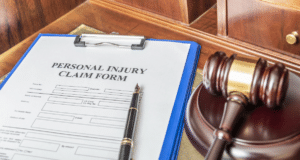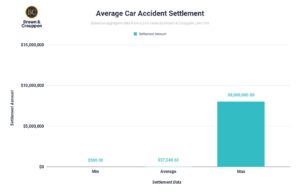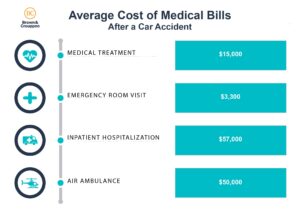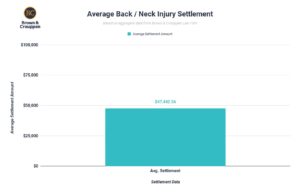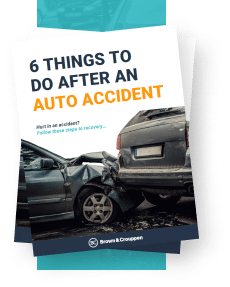If you were a passenger in a car accident, and the driver was at fault, you may be eligible to recover compensation for damages including medical expenses, lost wages, and non-economic damages such as pain and suffering.
Here’s what to do as a passenger in a car accident:
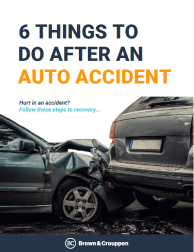

Use our legal checklist to learn what to do after an accident and understand key legal considerations for recovering financial compensation.
1. Seek Medical Attention
Your health and safety should be your top priority. If you have been injured, seek medical attention as soon as possible, even if you do not think your injuries are severe. Some injuries may not be immediately apparent, so it is best to get checked out by a medical professional. Too often, parties injured in a car crash try to “shake off” post-wreck soreness. However, fractures and tears may become irrevocably worse if not treated timely. Medical treatment isn’t cheap, but you only get one body in this lifetime, and it is important to prioritize your health.
As the injured party making a claim, you have the burden of proof not only that the other party is at fault for your injuries, but also that you suffered the actual injuries, that the incident caused the injuries, and that you experience symptoms and limitations as a result of your injuries. The insurance company will not take you at your word. They want to pay as little as possible on your claim. You can prove your injuries and limitations by providing medical bills and records as well as information from your employer for lost wages (or tax returns if you are self-employed). You may also provide contact information for witnesses to the incident in question or for “damages” witnesses who can speak to how you functioned before the incident versus after with your related injuries. However, the medical bills and records are generally the best, most credible (i.e., believable) evidence of your injuries.
2. Document the Accident
If possible, take photos of the accident scene, including the damage to the vehicles involved, the location of the accident, and any visible injuries you have sustained. Also, get the contact information of any witnesses who may have seen the accident. As a passenger, you will not be held legally responsible for the wreck except under certain circumstances (such as forcibly taking the wheel or acting in such a way in the vehicle to intentionally distract the driver or direct the actions of the vehicle), and there may be a disagreement between parties as to who is at fault.
Call the police and report the accident. The police will create an accident report, which will be important for any insurance claims or legal proceedings that may follow. Most insurance companies require that a police report or crash report is filed to make a claim. If no police respond to the scene, you may still make an accident report. Contact your local police department (or highway patrol) to find out how to file a post-crash accident report.
3. Notify Your Insurance Company
Contact your insurance company and inform them of the accident. They will need to know the details of the accident and any injuries sustained. Additionally, you may have insurance coverages that apply to the wreck even if you weren’t the driver and you weren’t in your own vehicle. If neither driver is insured, you may have applicable uninsured motorist coverage to cover your damages. You may also carry a type of insurance called MedPay, which can cover the cost of medical bills before a settlement is reached.
If you have the drivers’ insurance information, make a claim as soon as possible. If a driver hasn’t provided that information to you, then you can usually find that information in the police report.
4. Consider Contacting a Personal Injury Attorney
If you have been injured, you may want to consider contacting a personal injury attorney. They will advise you on your legal rights and help you seek compensation for your injuries, medical bills, lost wages, and other expenses related to the accident. On average, an inpatient hospitalization following an auto accident is $57,000. A personal injury attorney will find relevant parties (and insurance coverages), negotiate the settlement, determine the relevant medical bills and liens (and can negotiate the bills down after the settlement is reached), and help you with each step of the car accident settlement process for your case. Following an accident, how much a passenger in an accident may recieve typically ranges between $20,000 and $100,000 depending on the severity of injuries and other case factors.
Additionally, there may be issues of comparative fault, meaning it may be that both drivers are at fault or are alleging that the other driver is at fault. There are some instances where passengers are denied settlement offers because the drivers’ refuse to be accountable for their actions, so a lawsuit is required against both drivers. On average, car accident often settle within 6 to 9 months after medical treatment has been completed. However, complex cases involving comparative fault or previously denied claims may take longer to finalize.
Remember to prioritize your health and safety above all else, and take the necessary steps to protect your legal rights and seek compensation for any injuries or damages you have sustained.
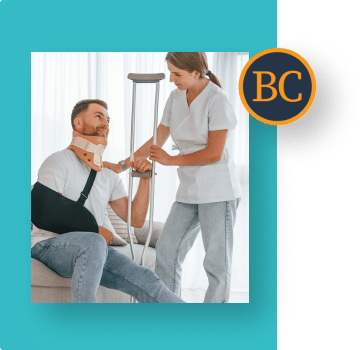
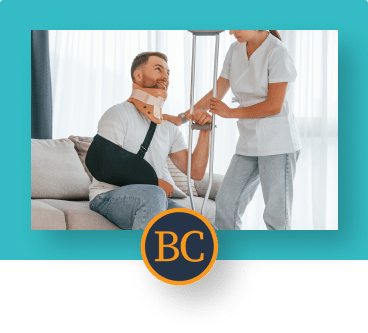
Were you injured in an accident due to someone else’s negligence? Get legal help from the most effective injury law firm in the Midwest.
Legal Considerations for Injured Passengers
When a passenger is injured in an auto accident, several legal considerations should be taken into account, depending on the circumstances and who is at fault. Here are the key considerations for each scenario:
The Driver of the Vehicle Is at Fault
- Liability: If the driver of the vehicle in which the passenger was traveling is at fault, the passenger may have a valid personal injury claim against the driver’s insurance company or the driver directly. The driver’s insurance policy should cover the passenger’s injuries and damages.
- Insurance claims: The passenger should notify the driver’s insurance company about the accident and their injuries to initiate the claims process. It may be necessary to provide medical records and other evidence to support the claim.
- Personal injury lawsuit: In some cases, if the driver’s insurance coverage is insufficient to compensate for the passenger’s injuries or if the insurance company denies the claim, the passenger may consider filing a personal injury lawsuit against the driver.
The Other Driver Is at Fault for the Accident
- Liability: If the accident was caused by another driver, the passenger may have a personal injury claim against that driver’s insurance company or the driver directly. The at-fault driver’s insurance policy should cover the passenger’s injuries and damages.
- Insurance claims: The passenger should notify the at-fault driver’s insurance company about the accident and their injuries. Providing necessary documentation and evidence will be important to support the claim.
- Personal injury lawsuit: If the at-fault driver’s insurance is inadequate or the claim is denied, the passenger may consider filing a personal injury lawsuit against the driver to seek compensation.
Both Parties Share Fault (Comparative Fault)
- Liability determination: In cases where both drivers or the passenger shares fault, the concept of comparative fault comes into play. Depending on the jurisdiction and the degree of fault assigned to each party, the passenger’s potential compensation may be reduced proportionately. For example, if the passenger is found to be 20% at fault and the total damages amount to $100,000, the passenger’s potential recovery may be limited to $80,000.
- Insurance claims: The passenger should notify both drivers’ insurance companies about the accident and their injuries. Each insurance company will investigate the accident and assess liability based on the evidence and applicable laws.
- Settlement negotiations or lawsuits: If liability is disputed or the insurance companies do not reach a fair settlement, the passenger may choose to negotiate a settlement directly with the parties involved or file a personal injury lawsuit to determine liability and seek compensation.
Statute of Limitations
It’s also important to consider the statute of limitations in your state. This will determine how long after the accident you will be eligible to file an injury claim. For example, the Missouri statute of limitations for car accidents is five years.
Once the statute of limitations deadline has been reached, you will no longer be eligible to file a claim.
When To Pursue Legal Action as a Passenger
Legal action as a passenger in a car accident should be pursued under certain circumstances, including the following:
- Serious injuries: If you have sustained significant injuries as a passenger in a car accident, it may be necessary to pursue legal action. This can help ensure you receive fair compensation to cover medical expenses, lost wages, pain and suffering, and other damages resulting from the accident.
- Long-term or permanent injuries: If your injuries have long-term consequences or result in permanent disability, it is crucial to consider legal action. These types of injuries may require ongoing medical treatment, rehabilitation, and accommodations, all of which can result in substantial financial losses.
- Disputes over liability: If there is a dispute over liability, where it is unclear who was at fault for the accident, legal action may be necessary. This often occurs in cases where multiple parties are involved or if there are conflicting accounts of the accident.
- Insurance claim denial or inadequate settlement offers: If the insurance company denies your claim or offers an inadequate settlement that does not cover your damages fully, pursuing legal action may be the next step. An attorney can help negotiate with the insurance company or file a lawsuit on your behalf to seek fair compensation.
- Complex legal issues: Some car accidents involve complex legal issues such as multiple parties, commercial vehicles, government entities, or defective products. In such cases, it is advisable to consult with a personal injury attorney who has experience handling complex cases and can navigate the legal complexities on your behalf.
It is important to consult with a personal injury attorney who can assess the specific details of your case and provide guidance on whether pursuing legal action is appropriate and in your best interest. They can evaluate the strength of your case, determine liability, and guide you through the legal process to seek fair compensation for your injuries and damages.
If you were injured as a passenger due to someone else’s negligent acts or omissions, you may be eligible to receive financial compensation. Getting started is easy. Get help from our legal team by calling us at 888-795-0694 for a free consultation, or get in touch with a car accident attorney by requesting a free case evaluation online. Our lawyers can evaluate the strength of your case, determine liability, and guide you through the legal process to pursue compensation for your injuries and damages
And remember, there’s no upfront cost to you — if you don’t get paid, we don’t get paid.

